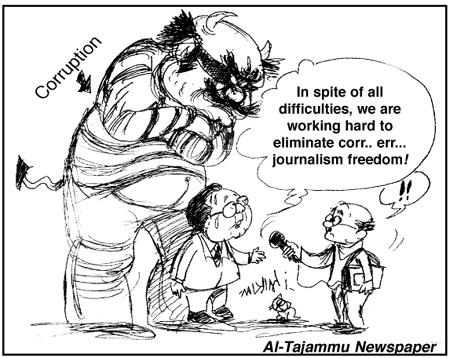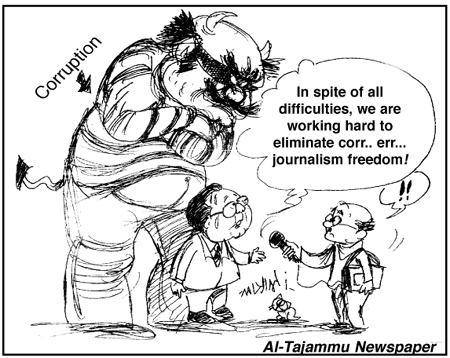
Yemeni Press at Stake [Archives:2001/37/Reportage]
September 10 2001
Jalal Al-Shara’abi
Yemen Times
” If I step down presidency, I prefer to be an editor in chief of a newspaper”-Jamal Abdualnassir
“We will not stop any journalist from writing”-President Ali Abdullah Salleh
“Mmen Katab Lubij” “He who dares to criticize will be beaten up”-Dr. Abdulaziz Al-Saqqaf, Founder of Yemen Times
” The duty of the Ministry of Information is to close down newspapers”- Mohammed Shahir Deputy Minister of Information
” A hungry journalist will never be creative” Waleed Abdulaziz Al-Saqqaf
– Editor-in-Chief of Yemen Times
” I don’t buy newspapers, but to chaise flies or to make me feel sleepy “- Nasir al-Shaibani former minister of endowments
” Journalists are like night clubs dancers working at night and sleeping at daytime”- Minister of Legal Affairs and former editor in chief of al-Methaq newspaper

Yemeni press has faced serious challenged in the past years, particularly in the wake of the 1994 civil war. The major problems include legal hassles, censorship of the Ministry of Information, lack of professionalism, and lack of an institutional press.
There is a general agreement that freedom of press and of opinion in Yemen are only relative and are governed by certain factors related to the complex social fabric of Yemeni society rather than the Press Law. Hence, those involved in tribalism and arms possession are conspiring to silence any one who dare to criticize corruption. Journalism is therefore a dangerous profession for its defenders who can be victims of violence amidst a prevailing environment of injustice and lawlessness. The Ministry of Information’s latest decisions highlight its intention to close down a number of independent and partisan newspapers on the pretense that these newspapers are inconsistent with the laws and regulations established by the Ministry.
The Ministry might be right in its argumentation with regard to inconsistency with the Press & Publication Law, but it is also clear that the Ministry of Information exercises censorship and use a double standard on press organs.
Many newspapers are facing legal prosecution from various courts as a result of publication problems.
The following remarks can be made about the legal status of Yemeni press: some newspapers were awarded licenses although neither they nor their owners have the proper qualifications to be newspapers or publishers. The Press Law should then be applied on all newspapers without any bias or prejudice. Moreover, the funds allocated by the Ministry of Information to the newspapers do not exceed YR 5,000 a month per newspaper. In fact, such a situation is not encouraging nor promising, as the government by this way undermines the concept of establishing an institutional press.
It is also clear that the Ministry of Information, as a guardian of the national unity and the country’s sovereignty, files complaints and accusations against the different newspapers. Unfortunately, these accusations are sometimes groundless and only aimed at prosecuting the press and its journalists. The government should instead establish a court in charge of press issues since a journalist is not a criminal to be referred to a criminal court chaired by a judge who know nothing of press regulations.
The situation of press can be improved if the existing newspapers can become independent and free of any affiliation through finding self-supporting avenues. In the same time, the government must allocate sufficient funds for the existing newspapers and promptly adopt the ‘journalists cadre’ (a draft law to increase the payroll of journalists).
Newspapers can indeed be a main contributor to development, stability, and prosperity in our nation. Why then does the government not allocate a small part of the enormous funds available for national security to support the journalist cadre?
We are not asking for the closure of the Ministry of Information. The Ministry of Interior would then assume the duties of the former which, for sure, would be more catastrophic. We are requesting again the enforcement of the Press Law in order to improve the journalists’ conditions and create a real press able to change the current stagnant situation of Yemeni press.
The threats of the Ministry of Information to close down newspapers pretexting their illegality is an illogical argumentation, as the Ministry has not taken any concrete action against the defamation campaign started by some newspapers against some personalities. So why closing down newspapers for not being illegal? Yemeni press is currently going through a dark tunnel and the Ministry of Information is partly responsible for this alarming situation.
Freedom of press is not a lie for media consumption as democracy and freedom are unalienable rights which reflect the degree of development of any nation. A rise in the violations perpetrated against press is observed in our country. One question comes out:
Is Yemeni press prone to closure?
——
[archive-e:37-v:2001-y:2001-d:2001-09-10-p:./2001/iss37/report.htm]


